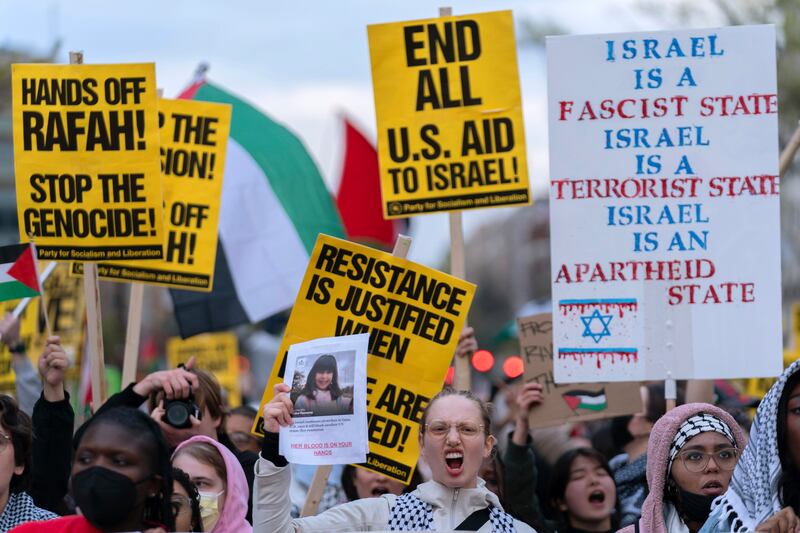“You’re going to think I’m crazy,” a friend of mine began over dinner the other night. A lapsed Protestant and Midwesterner, she leaned in and said, “I really think there’s a conspiracy going on — against the Jews.”
Married to a Jewish man and raising their children Jewish in Brooklyn, my friend has watched the past eight months unfold with a sense of horror. It’s not just Oct. 7 or the campus protests, either. It’s the way that many elites in this country seemed to have changed the narrative to blame a massacre of Jews on the Jews. She couldn’t understand how it was that an attack by Hamas on innocent civilians had launched protests calling Jews genocidal or lambasting Israel for rescuing its hostages.
In fact, I didn’t think she was crazy, in part because I’ve had the same conversation two other times in the past few weeks.
Another friend — a Catholic married to a Jewish man and raising Jewish kids — and an evangelical friend whose closest circle of friends includes a lot of Jews both revealed to me their growing suspicions of a coordinated campaign of powerful people trying to make it seem as if Jews are the perpetrators of violence, responsible not only for death and destruction in Gaza but also around the world.
My evangelical friend told me, “I know God has chosen the Jews and will protect them, but this is nuts.” These mothers never thought they would have to worry about the safety of their Jewish children walking around Manhattan or Westchester County, let alone going to an Israel parade. They genuinely cannot understand how we have reached this point, and the most logical conclusion is “connecting the dots.”
I had to laugh a little bit. These were all women who, until adulthood, didn’t really know much about Jews. America has long been a philosemitic country and to the extent that my friends had any feelings about Judaism, they were positive ones.
In their book “American Grace,” Robert Putnam and David Campbell describe a sort of thermometer for measuring the level of warmth Americans feel toward people of other faiths. Jews and Catholics ranked at the top of the list, with around three-quarters of Americans having positive feelings toward them. One of the interesting findings in the book is that the more Americans get to know people of other faiths, the more they like them. Which was certainly true for these three friends of mine.
But as they became closer with and even married into Jewish families, they also got a very intimate view of what it means to be Jewish. Don’t get me wrong — even most Jews I know have been shocked by the events of the past few months. Who would have thought that masked men would be walking onto New York subways and telling “Zionists” to raise their hands and then telling them this is their “chance to get out,” as happened earlier this month. But any Jew of a certain age or with an awareness of history knows that this is what eventually happens. Jews are singled out, harassed and persecuted, and then the real violence begins.
Even in a culture that seems to prize victimization as a positive quality, Jews have once again gotten the short end of the stick. We all support women who have been victims of sexual assault, or people who are victims of terrorism, or indigenous people — except if they’re Jewish, and then some people withdraw that support.
The truth is that I think my friends — despite the fact that they are part of a small bubble geographically and culturally — are actually more representative of the American population, than, say, the editorial boards of the major newspapers or folks trying to broker peace deals at the U.N. I have spent a fair bit of time traveling in this country for work and for pleasure, and I am hard-pressed to think of instances where I have experienced overt antisemitism. Indeed, when people don’t know much about Judaism, their questions are genuine, warm and welcoming. Of course, I know there is bigotry that bubbles beneath the surface in some communities. But I suspect most Americans are as puzzled as I am about the events of recent months.
When they see people rioting across from the White House or taking over college administration buildings while yelling antisemitic slogans, some will see an organized conspiracy to change the narrative. Others won’t ponder any further. They know evil when they see it.
Naomi Schaefer Riley is a senior fellow at the American Enterprise Institute, a Deseret News contributor and the author of “No Way to Treat a Child: How the Foster Care System, Family Courts, and Racial Activists Are Wrecking Young Lives,” among other books.


